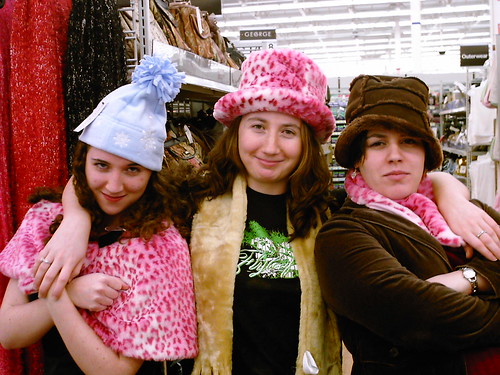I made up this word a while back, during an AIM conversation with a friend. Turns out that the word exists, but I did independently come up with it. Its construction is actually quite logical and therefore it's not surprising that my creation is less than totally original.
Anyway, chronocentrism means believing the prevailing ideologies and ways of viewing the world in your present historical era are more superior and right than all other eras. Actually, it can best be applied to ideas/people who are
not aware of historical ways of thinking and take their view on issues to be eternal or timeless. Very rarely is this true. I would venture to say that it never is.
It is this realization, more than anything, that has structured my intellectual transformation since I began college. This realization that the frames and lenses through which we view the world are inherently shaped by our culture and our values (and that culture and values change over time) caused me to question some of the fundamental tenants of my worldview. What seems "natural" no longer seems so. Things that appear to be "inevitable" are actually a result of a particular historical progression.
Not only are our perspectives shaped by our historical and cultural location, they are shaped by our cultural location. This awareness, that all of our knowledge is situated, leads me to the study of race and gender and class. How are our experiences shaped by these variables and how do those experiences alter our perceptions and interactions?
These issues are what I most try to impress on people when getting into discussions about broad social or religious or moral or political issues. "What we know" is not only incomplete and situated but could also be very different. Thinking inside the chronocentric box limits our thinking and our possibilities for change.
So...
What does it mean to say that certain religious ideas are socially constructed? Sacred texts may be the word of God, heck, lets even assume that they are literally the Word of God. Even better, lets assume that English translations are
still the word of God. Given those assumptions (bear with me), there's still a problem: interpretation
always, always, always occurs in a social context. And the social context can change dramatically.
1850: The Bible is used to justify human slavery.
1950: The Bible is used to preach liberation for oppressed people.
Very few, even the most racist Christians, would argue that the Bible allows for slavery today. (And, I should know, I ordered the KKK starter pack just to see what all was in it, and
wow, but that's a post for another day.)
But that one's easy. And doesn't challenge chronocentrism. I mean, you can still say that those wacky Southern slave holders were wrong, but finally,
today, we have the One True Interpretation of scripture. Harder would be to challenge a current belief and show 1) it's constructed nature, and 2) how it could be different.
Let's take, say, homosexuality.
Ok, I am not going to get into the massive, huge, ongoing debate about what scripture actually says about homosexuality. That is beyond the scope of what I'm trying to do. But, just so it's out there, there is by no means consensus among religion scholars that the present-day interpretation of Biblical scriptures as banning homosexuality is "correct." Much of this debate centers on the original language of the works, the social context of the writing, and issues arising from translation. It is fascinating stuff.
But my point is to look at how
interpretation of scripture has been altered by social context. What is the context of the scholarly debate going on and how did we get to this point in our reading of what the Bible says about homosexuality?
When I started out this post, I thought I was going to finish it. But I realize now that that would be too much of an undertaking. I need to do some more reading to present a more complete and fair analysis of homosexuality in Christianity (historically). I found some interesting stuff about how homosexuality (mostly male that I could find information on) was not only tolerated but accepted in the early church. But it didn't have sources and felt incomplete. I need to do more reading on this topic. I may start with
this?But, to illustrate my broader point, I'll choose another topic and give it a quick and dirty run-down. Abortion. Many Christians oppose it. And they say that their opposition is rooted in their faith. And I believe them. Because faith is something personal, not something historical. Faith is what you believe here and now, not what Christians have always believed. Faith is a good thing, I have faith.
I'm not knocking it at all. But faith often does not come with a view of the constructed nature of its beliefs. It often takes those beliefs to be timeless and eternal. Faith can still hold after a recognition of its situatedness, but it's harder.
Anyway--back to abortion. Hebrew law says that if someone attacks a woman and kills her, the punishment is for murder. However, if someone attacks a pregnant woman, injures her, but kills the fetus, that is treated as a property crime rather than as a murder. This is similar to the Aristotelian idea of "delayed ensoulment," the idea that the soul doesn't actually enter the body of a fetus until it is well along in development.
Some in the early Christian church opposed abortion:
St. Hippolytus (circa 170-236 CE): "Reputed believes began to resort to drugs for producing Sterility and to gird themselves round, so as to expel what was conceived on account of their not wanting to have a child either by a slave or by any paltry fellow, for the sake of their family and excessive wealth. Behold, into how great impiety that lawless one has proceeded, by inculcating adultery and murder at the same time." Refutation of all Heresies
9:7Minicius Felix (Christian lawyer, circa 180 - 225 CE): "Some women take medicines to destroy the germ of future life in their own bodies. They commit infanticide before they have given birth to the infant."St. Augustine (354-430 CE) reversed ideas about abortion, returning Christian theology to a "delayed ensoulment" kind of philosophy. The consequences of this are that abortion early in a pregnancy is not murder, as the fetus is not seen to have a soul.
Some Christian leaders, however, did not totally buy into Augustine and still punished abortion. However (and this, to me, is a big however), it was generally grouped with sins that prevented conception such as practicing coitus interruptus or through consuming products intended to induce sterility. It was also grouped with sins meant to regulate sexuality, such as oral sex.* However, in comparison with these other sins, abortion was actually considered a less serious offense, with punishment requiring 120 days of penance and the punishment for oral sex lasting from 7 years to a lifetime.
Several Popes (Steven V, Innocent III) then took the view that abortion is not murder until quickening, the point at which movement by the child is first felt. St. Thomas Aquinas did not consider abortion murder until quickening, when the fetus was "animated."
Sorry, this is going on far far longer than I thought it would. Needless to say, there are many switches, but the quickening doctrine was pretty stable in theology and in law. In America, we begin to see the first abortion laws in the 1820s, which forbid abortion after the fourth month of pregnancy. By 1965, all states had some abortion bans, though they varied widely from state to state. Most of these bans can be attributed to the rise of physicians as a profession, and gynecology as a speciality. You see, midwives were the primary providers of abortion services to women. They were huge competitors with doctors. The AMA was really influential in getting state-wide bans. In 1973, when many of these bans were overturned by the US Supreme Court, we began to see the rise of abortion as a religious issue. I, of course, am opposed to abortion. But I like to think that I am reflexive about why, and I recognize the sociohistorical context in which ideas about "life" are salient as religious ideas.
I guess that my overarching point in this is that people who are socialized to view abortion as a religious issue aren't wrong--but they are acting within a social context that has given them a particular "knowledge" about certain issues and urges them to think about them in a particular way. If they had been born in a different time, they would not see abortion as a religious issue. Is their view of Christianity and abortion "wrong"? That's their call. What I am calling for is a recognition of the history. We need to get away from the chronocentrism and the arrogance that suggests that
our philosophy, that
our teachings, that
our interpretations of scripture are the
only ones or the
best ones.
Another example: conservative religion + conservative politics. Not natural bedfellows, really. But I know several conservative Christians who would say that conservative politics (tax cuts for wealthy, supply side economics, minimal welfare state, etc) goes hand in hand with their faith. Well, um, no. I mean, it does in our present culture. But it's by no means fundamental. Look at fundamentalist and evangelical populist and socialist movements back in the day. Our present religio-political climate encourages the linking of political and religious "knowledges" and thus what seems "natural" is in fact highly strategic and engineered. There are several books on this subject and histories of how the two came to be linked. I'm not passing judgement on this link, but what I am saying is that it is not natural or inevitable.
Another quick example: Baptism as "outward sign" and "Sinner's prayers" as leading to salvation. While these are not by any means the only Christian views on the subject, they are certainly hegemonic within modern day Christianity (
here are examples of people who reject those particular doctrines). But they are new. It has not always been the case that Baptism was an outward reflection of an inward change. The idea of praying your way into salvation is also a relatively new one, theologically speaking. Are these ideas
wrong? Again, not for me to decide. But--people who believe these should confront their chronocentrism and realize the historical nature of their beliefs. Those weren't the beliefs of, say, the early church or the medieval church. And that's ok. But, they were constructed.
And the realization that
all of what we believe (not just religion) is constructed is important in order to be able to challenge our accepted notions and assumptions about how the world works. Thomas Kuhn argued that the biggest revolutions in physics have come, not from physicists, but, rather, from people outside of that field. Disciplines socialize people into how to think about issues. That's a good thing, because it gives us focus and a theoretical framework. But it also gives us blinders. That why people trained in a different field, such as mathematics, were able to look at a problem confounding physicists in an entirely new and different way. They didn't share the same limiting assumptions.
This ability (or at least the potential ability) to question my assumptions, to always look at the history of ideas, to understand the ways in which ideas have been constructed, has revolutionized how I think about the world and how I relate to it. Central to this has been overcoming chronocentrism.
So, yeah, the point of this post: go forth and use the word "chronocentrism." If I ever read it anywhere, I will assume that I started it, even though a google search reveals otherwise.
*I argue that the current pro-life crowd, at least the leadership, is less concerned with "life" per se and more concerned with the regulation of sexuality, particularly womens' sexuality. I will post about this later if I think about it. NB: I am not the only one (by far) to take this view, but, coming from my background, it was a big step to take and I came to it independently.


 Turns out the fitting rooms aren't open at midnight. So Ashley tries on clothes in a secluded area.
Turns out the fitting rooms aren't open at midnight. So Ashley tries on clothes in a secluded area.




